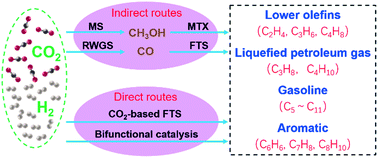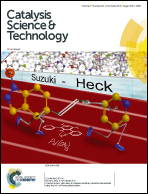A review of the catalytic hydrogenation of carbon dioxide into value-added hydrocarbons
Abstract
Chemical utilization of CO2 to chemicals and fuels is very attractive because it can not only alleviate global warming caused by increasing atmospheric CO2 concentration but also offer a solution to replace dwindling fossil fuels. Hydrogen is a high-energy material and can be used as the reagent for CO2 transformation. Moreover, when hydrogen originates directly from renewable energy, CO2 hydrogenation can also provide an important approach for dealing with the intermittence of renewable sources by storing energy in chemicals and fuels. Therefore, much attention has been paid to CO2 hydrogenation to various value-added hydrocarbons, such as lower olefins, liquefied petroleum gas, gasoline, aromatics and so on. The focus of this perspective article is on the indirect and direct routes for production of hydrocarbons from CO2 hydrogenation and recent developments in catalyst design, catalytic performance and reaction mechanism. In addition, a brief overview on CO2 hydrogenation to methanol is given, which is a critical process in the indirect route involving conversion of CO2 into methanol and subsequent transformation into hydrocarbons. We also provide an overview of the challenges in and opportunities for future research associated with CO2 hydrogenation to value-added hydrocarbons.



 Please wait while we load your content...
Please wait while we load your content...